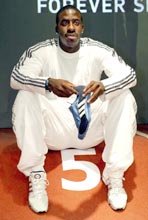Home > Sports > News > Reuters > Report
'B' sample confirms Chambers took THG
Ossian Shine |
November 07, 2003 11:04 IST
European 100 metres champion Dwain Chambers's positive test for the designer steroid THG has been confirmed by a second test. The result of the British sprinter's B test was known by Thursday evening and matches that of the positive A test, a source close to the testing process said.
Chambers's lawyer Graham Shear said he had not had a official notification of the result and nor had UK Athletics.
Once UK Athletics receives official notification of the positive B sample, a disciplinary hearing will be set up.
 If that hearing finds 25-year-old Chambers guilty, he will face a minimum ban of two years and, under the guidelines of the British Olympic Association's anti-drug stance, he would receive a life ban from the Olympics.
If that hearing finds 25-year-old Chambers guilty, he will face a minimum ban of two years and, under the guidelines of the British Olympic Association's anti-drug stance, he would receive a life ban from the Olympics.
Spokesman for world athletics' governing body, the IAAF's Nick Davies, confirmed that Chambers's B sample had been tested in Los Angeles on Monday, but said the result had not yet been made public.
"No letter has been sent yet from the IAAF to UK Athletics. That will be tomorrow (Friday) morning at the latest," Davies said."
UK Athletics will wait until they have received official notification of the result from the B sample before issuing any statement.
Chambers admits having taken THG, which was discovered on August 1 in an out-of-competition test in Germany, but says he was unaware of the contents of the supplements he was taking.
The Londoner is one of five athletes to have tested positive for THG and the third to have their B sample analysed by the IOC-accredited laboratory in Los Angeles.
The B tests on the others, who have not been named, also confirmed the initial findings, sources said. It is very rare for a B sample not to confirm the A.
 | Also Read |  | |
|
The Olympic and professional sports world was shocked last month when the U.S. Anti-Doping Agency reported that a new undetectable steroid -- THG -- had been created that would allow elite athletes to pass doping tests.
Steroids are used to improve performance and help athletes recover faster from training.
THG has been tweaked by chemists to make it undetectable under normal testing methods.
The USADA discovered THG when an unnamed track and field coach provided it with the names of U.S. and international athletes who he said were using the steroid.
The coach gave USADA a used syringe that contained some of the substance.
The International Olympic Committee-accredited laboratory in Los Angeles identified the substance and developed a test for it.
Within days, details of the test were rolled out to all 30 IOC-accredited laboratories around the world.
The IAAF is due this month to re-test all samples taken during August's world championships. Their lead has been followed by FINA who said on Wednesday that all samples taken from July's world swimming championships would be re-tested.